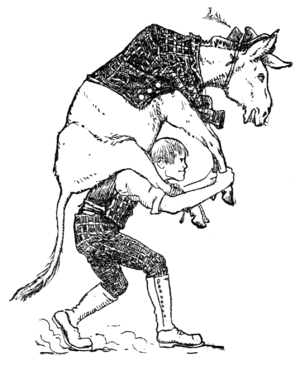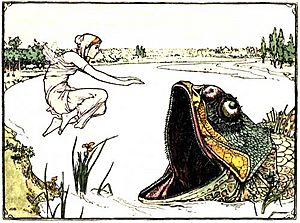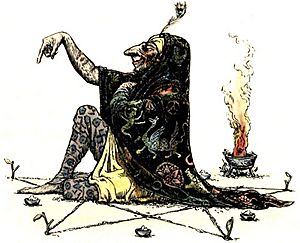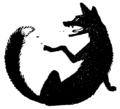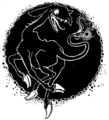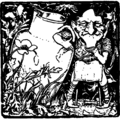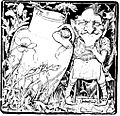John D. Batten facts for kids
John Dickson Batten (born October 8, 1860 – died August 5, 1932) was a talented English artist. He was born in Plymouth, England. John Batten was known for painting people using different types of paint like oils, tempera, and fresco. He also illustrated many books and made prints. His wife, Mary Batten, was a gilder, which means she worked with gold leaf. They were both active members of the Society of Painters in Tempera.
Contents
John Batten's Art Career
John Batten studied art at the Slade School of Fine Arts. He showed his artwork at the Grosvenor Gallery until 1887. He often painted pictures about myths and old stories.
Some of Batten's famous paintings include The Garden of Adonis: Amoretta and Time, The Family, Mother and Child, and Atalanta and Melanion. He also painted scenes from classic fairy tales like Sleeping Beauty: The Princess Pricks Her Finger and Snow White and the Seven Dwarves.
Illustrating Fairy Tales
In the 1890s, John Batten became very well-known for illustrating fairy tale books. These books were put together by Joseph Jacobs, who was a member of the Folklore Society.
Batten illustrated several popular collections, including:
- English Fairy Tales
- Celtic Fairy Tales
- Indian Fairy Tales
- More English Fairy Tales
- More Celtic Fairy Tales
- Europa's Fairy Book (also called European Folk and Fairy Tales)
He also created pictures for English versions of Tales from the Arabian Nights and Dante's Inferno.
Besides his art, Batten also wrote two books of poetry. He even wrote a book about how animals and humans fly!
Reviving Tempera Painting
Towards the end of the 1890s, John Batten became very interested in an old painting method called egg tempera. This technique uses egg yolk to bind the paint pigments. He played a big part in bringing this painting style back into use, working with artists from Birmingham like Arthur Gaskin.
His painting Pandora, made with egg tempera, was shown at the Royal Academy of Arts in 1913. It was later given to Reading University in 1918, where it has been carefully restored. John Batten also worked as a Secretary for the Society of Painters in Tempera. In 1922, he wrote an article called The Practice of Tempera Painting, sharing his knowledge about this art form.
Gallery of Illustrations
Images for kids
 | Georgia Louise Harris Brown |
 | Julian Abele |
 | Norma Merrick Sklarek |
 | William Sidney Pittman |


